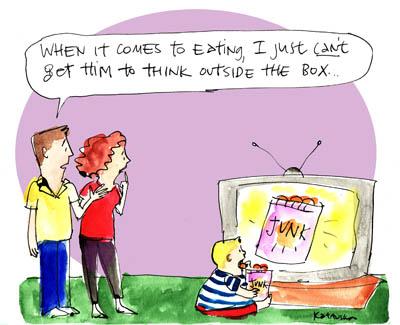Advertisement during children’s TV programs can have a very controversial effect on the way children behave. It had been studied by American Psychological Foundation that children under 6 years old cannot distinguish between the actual show and the advertising. The fact that many companies sell things like candy and fast food might contradict with what parents want for their children. For example during an episode aimed at children an ad shows the possible gifts that a child can get when ordering a Kids Meal. This will definitely appeal to the child because not only is the ad alluring him/her to get it for the gift, but also because of the tasty meal. Many parents wouldn’t want their children to constantly go to a fast food restaurant because it isn’t healthy. Mostly it would be better for advertisements to encourage children to eat healthy but based on the following chart from the Kaiser Family Foundation most of the food advertised to children can’t really be considered healthy.

Furthermore, obesity can be linked to the advertising that children see every day, the more they are encouraged to buy unhealthy foods the more likely they are to have a certain obesity problem. This may be referred to as exploitative because generally young children are prone to recall many aspects of an ad. In addition, product placement in movies and TV shows can greatly influence the products a child would like to consume according to AAP Pediatrics.
The government needs to look to regulate the type of advertising that children can view, especially ones that try to allure them to buy it because of other benefits (such as a gift). It would certainly be better for food companies to offer a healthier menu and promote that to children.

This image summarises what the post is about.
The blog post I looked at was a Longwood Blog
